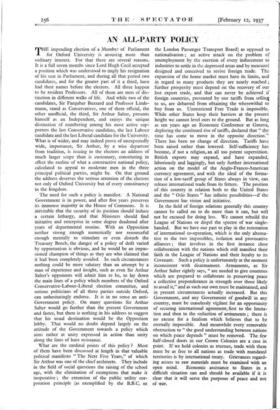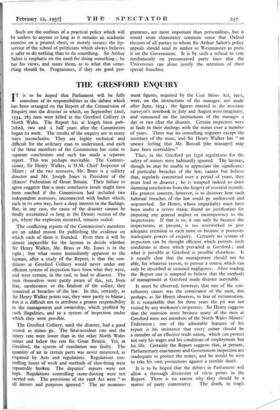AN ALL-PARTY POLICY T HE impending election of a Member of
Parliament for Oxford University is arousing more than ordinary interest. - For that there are several - reasons. It is a full seven months since Lord Hugh Cecil accepted a position which was understood to imply his resignation of his seat in Parliament, and during all that period two candidates, and for the greater part of it a third, have had their names before the electors. - All three happen to be resident Professors. All of them are men of dis- tinction in different walks of life. And while two of the candidates, Sir Farquhar Buzzard and Professor Linde- mann, stand as Conservatives, one of them official, the other unofficial, the third, Sir Arthur. Salter, presents himself as an Independent, and enjoys the unique distinction of numbering among his most active sup- porters the last COnservative candidate, the last Labour candidate and the last Liberal candidate for the University. What is of wider, and may indeed prove of unexpectedly wide, importance, Sir Arthur, by a wise departure' from tradition, is issuing to the electors an address of much larger scope than is customary, constituting in effect the outline of what a constructive national policy, calculated to appeal to moderate men in the three principal political parties, might be. On that ground the address deserves the serious attention of the electors' not only of Oxford University but of every constituency in the kingdom.
The need for such a policy is manifest. A National Government is in power, and after five years preserveS its immense majority in the House of Commons. It is inevitable that the security of its position should 'induce a certain lethargy, and that Ministers should find initiative and enterprise in some degree deadened after years of departmental routine. With an Opposition neither strong enough numerically nor resourceful enough mentally to stimulate or even disturb the Treasury Bench, the danger of a policy of drift varied by opportunism is obvious, and he would be an impas- sioned champion of things as they are who claimed that it had been completely avoided. In such circumstances nothing could be more salutary than an attempt by a man of experience and insight, such as even Sir Arthur Salter's opponents will admit him to be, to lay down the main lines of a policy which members of the Oxford Conservative-Labour-Liberal election committee, and serious politicians of all three parties outside Oxford, can unhesitatingly endorse. It is in no sense an anti- Government policy. On many questions Sir Arthur Salter would go further than the present Government and faster, but there is nothing in his address to suggest that his usual destination would be the Opposition lobby. That would no doubt depend largely on the attitude of the Government towards a policy which aims rather at unity expressed in action than unity along the lines of least resistance.
What are the cardinal points of this policy ? Most of them have been discussed at length in that valuable political manifesto " The Next Five Years," of which Sir Arthur was one of the chief architects. They include in the field of social questions the raising of the school age, with the elimination of exemptions that. make -it inoperative ; the extension of the public utility 'cot-, poration principle (as exemplified by the $.13.C; or the London Passenger Transport Board) as opposed to nationalisation ; an active attack on the problem of unemployment by the exertion of every inducement to industries-to settle in the depressed areas and by ineasured designed and conceived to"revive 'foreign trade. The expansion of the home market must have its limits, and in regard, to many products they are nearly reached ; further prosperity must depend on the recovery of our lost export trade, and that can never be achieved if foreign countries, prevented by our tariffs from selling to us, are debarred from obtaining the wherewithal to buy from us. Unrestricted Free Trade is impossible.
While other States keep their barriers at the present height we cannot level ours to the ground. But as long as ten years ago an Economic Conference at Geneva, deploring the continued rise of tariffs, declared that " the time has come to move in the opposite direction.3' There has been no change of direction. Tariffs have been raised _ rather than lowered. Self-sufficiency has become, if not a religion, an. all too potent superstition. British exports may expand, and have expanded, laboriously and laggingly, but only further international action on the model of the Anglo-Franco-American currency agreement, and with the ideal of the forma- tion of a low-tariff group of States always in view, can release international trade from its fetters. The position of this country in relation both to the United States and the " Oslo States " has infinite possibilities—if the Government has vision and initiative.
In the field of foreign relations generally this country cannot be called on to do more than it can, but will not be excused for doing less. We cannot rebuild the League of Nations or dispel the spectre of war single- handed. But we have our part to play in the restoration of international co-operation, which is the only alterna- tive to the two impossibles, isolation and provocative alliances ; that involves in the first instance close collaboration with the nations which still manifest their faith in the League of Nations and their loyalty to its Covenant. Such a policy is unfortunately at the moment inconsistent with disarmament. Armaments, as Sir Arthur Salter rightly says, " are needed to give countries which are prepared • to collaborate in preserving peace a collective preponderance in strength over those likely to assail it," and as such our own must be maintained, and in present circumstances actually increased. But this Government, and any Government of goodwill in any country, must be ceaselessly vigilant for an opportunity of securing international agreement, first to the limita- tion and then to the rediietion of armaments; there is no excuse for a fatalism which believes that to be eternally impossible. And meanwhile every removable obstruction to ".the good understanding between mitions• on which peace depends " must be removed. The few half-closed doors in our Crown Colonies are a case in point. If we hold colonies as trustees, trade with them must be as free to all nations as trade with mandated territories is by international treaty. Grievances regard-. ing access to raw materials must be examined with an open mind Economic assistance to States in a difficult situation can and should- be available- if it is clear that it will serve the purposes of peace and not of .war. Such are the outlines of a practical policy which will be useless to anyone so long as it remains an academic exercise on a printed sheet, or merely secures the lip- service of the school of politicians which always believes it safer to do nothing than to do something. Sir Arthur Salter is emphatic on the need for doing something ; he has his views, and states them, as to what that some- thing should be. Programmes, if they are good pro- grammes, are more important than personalities, but it would seem elementary common sense that Oxford electors of all parties to whom Sir Arthur Salter's policy appeals should send its author to Westminster to prds it on the Government. It is by such a refusal to vote mechanically on preconceived party lines that the Universities can alone justify the retention of their special franchise.















































 Previous page
Previous page